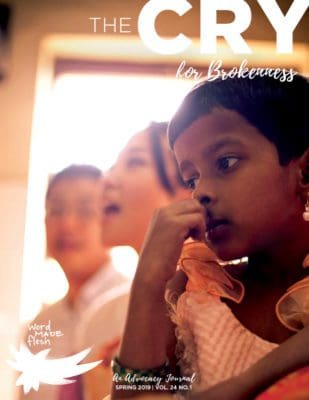From the Editor — Brokenness
 Brokenness is an inescapable part of the human experience.
Brokenness is an inescapable part of the human experience.
It is often easier to ignore it, the brokenness that exists out in the world and that which exists within. This sense of being hurt, bruised, torn beyond repair is powerful enough to take us into despair, as the apostle wrote, “For we were so utterly burdened beyond our strength that we despaired of life itself.” (2 Corinthians 1:8)
So, God brought to us the promise of wholeness and redemption. We understand that through Christ, this work was already finished, and yet, we do not see it fully. This truth of redemption doesn’t always feel, well, true. In this tension, the temptation is to run past brokenness — sometimes to just not deal with it at all — because of the hope that we have, and the promise of new life.
Though this running is well-intended, we must remember that God embraced the things and people that seemed too broken. He did not ignore them. It wasn’t too much for Him; He heard their cry.
Christ, taking on human form and submitting himself to the human experience, lived out with us the brokenness of our world and of our sin. Yet, He did not shy away nor recoil. He embraced us — like the father who was waiting for the son of prodigal living — before we could tell Him about how broken we were. He stopped us in our tracks whispering, “Don’t worry. I love you in your brokenness,” and offered us healing.
This is the hope of the Gospel! Jesus embraced us in our brokenness, experienced it with us for our sake, and endured the breaking of His body to show us that we could never be too broken for Him. The resurrection promises that He makes things new and whole again, no matter how broken or hopeless they might seem.
As He lovingly wills to restore, broken things then have become worthy of celebration — they present opportunities for us to see Him gloriously at work, and for us to labor with Him.
Word Made Flesh has responded to these opportunities around the world seeking to be like Jesus in His loving embrace of brokenness. You’ll find in the following pages that in the process of embracing the brokenness of others and of the world, we tend to encounter our own.
Our folks wrestle alongside people who have experienced severe brokenness and together find ways to mourn and to hope.
“Jesus wept” with his friends before He caused Lazarus to come out of his grave. Thus, we do not celebrate brokenness in a manner of complacency or hopelessness, but as a prophetic act displaying what it looks like to mourn as Jesus did, with hope of resurrection and the restoration of all things.
Our hope is that these stories would inspire you to celebrate this lifestyle with us. May you see God’s loving hand at work in and through the brokenness in your midst.
It is because of brokenness that we cry out. We cry for wholeness. We cry for justice. We cry — and God promises to answer.

JORGE CASTORENA
Editor of The Cry
jorge.castorena@wordmadeflesh.com
![]()
![]()
